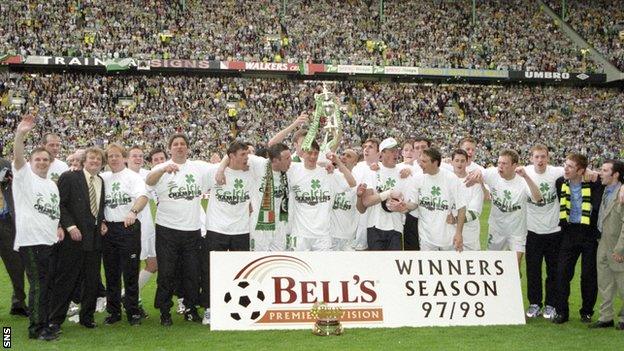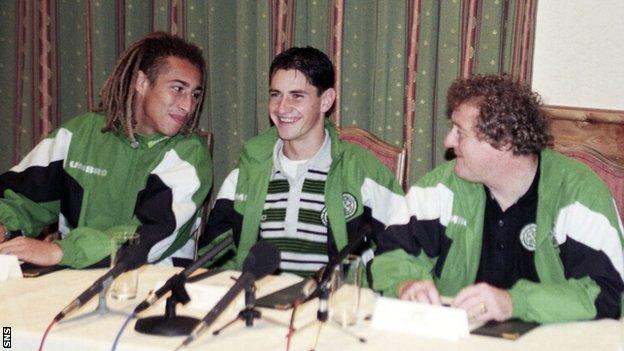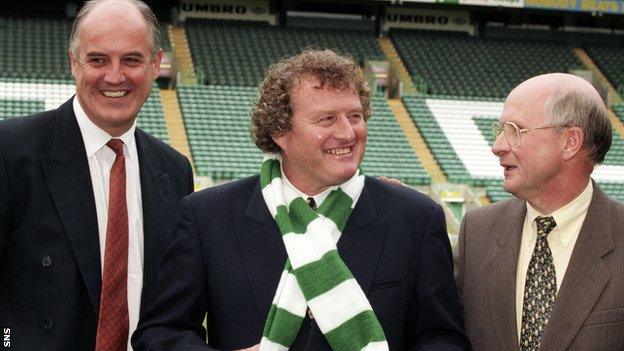Wim Jansen: Tribute to Celtic manager who stopped Rangers' 10 in a row
- Published

Wim Jansen steered Celtic to their first title in a decade in 1997-98 as well as League Cup success
If there was a blink and you'll miss it dimension to the late Wim Jansen's brief time as manager of Celtic, there is also a perplexing glory about his one and only season in Glasgow - a memory that will stand forever.
Jansen's Celtic ended Rangers' 10-in-a-row bid and, for that feat alone, he will never be forgotten by anyone at the club, or by anybody at the other club either. But there are more reasons why his name will remain alive - one of them being the towering legacy of being the man who brought Henrik Larsson to Celtic.
Jansen achieved a huge amount in the game. He won a European Cup (against Celtic) in 1970, he played in two World Cup finals in a magnificent Netherlands team in 1974 and 1978.
Somewhere along the line Johan Cruyff said this about him: "Wim Jansen is one of only four men in the world worth listening to when they talk about football." Given that Cruyff, in the opinion of many experts, could be considered one of the most influential football coaches or managers in the history of the game, that was quite a comment in praise of Jansen.
And yet, for all of that, in this corner of the world, he will be most remembered for season 1997-98 and one of the wackiest campaigns of them all, a title won not just in the face of the relentless dominance and the indiscriminate spending of their 10-in-a-row-chasing rivals across the city but also a league secured against a backdrop of total dysfunctionality behind the scenes at Celtic Park.
There are many snapshots to illustrate the point. One could be Jansen's admission that he wanted to resign after two or three weeks in the job, such was the breakdown in his relationship with general manager Jock Brown and owner Fergus McCann.
Another could be a story from the day they beat St Johnstone, thereby winning the title and heading off the grim prospect of Rangers breaking the record books with 10 straight league championships.
Brown later wrote about that day and how he made his way pitchside at Parkhead to congratulate his manager. His recollection is that he stuck out his hand when Jansen approached and that the Dutchman snubbed him, lowering his head and walking straight on past to the dressing room.
"A handshake was out of the question," wrote Brown years later. Even in the hour of their greatest triumph in many years, there was no thawing in the bitterness and rancour at the heart of the club.

Henrik Larsson (left) went on to become a Celtic legend after Wim Jansen (right) brought him to the club
To chart what was surely one of Celtic's most eventful seasons you have to go back to the summer of 1997. In May, Jorge Cadete (38 goals in his 48 games) left and Paul McStay, the beacon of the club, retired. In August, Paolo di Canio (who had one outstanding season at the club) departed. A few months earlier, Pierre van Hooijdonk - 56 goals in 92 games including the winner in a cup final - had been sold.
At the same time, Rangers signed Lorenzo Amoruso from Fiorentina for £5m, Sergio Porrini from Juventus for £4m and Marco Negri from Perugia for £3.7m. They also signed Rino Gattuso, a future World Cup winner.
Jansen had also spent, but nowhere near as lavishly. Darren Jackson, Craig Burley, Stephane Mahe, Marc Rieper and Harald Brattbakk all joined, along with somebody called Larsson (for £650,000), who didn't look up to much as Celtic lost their first two league games.
At that point, you could have walked into any bookmaker in Glasgow and named your own odds on Celtic winning the league. The 10 looked like the greatest certainty of them all.
The new manager was the first continental to take the reins at Celtic and was only the second non-Celtic player to be given the job. That lack of emotional attachment probably helped him.
He knew his history, but it didn't consume him. His head didn't explode under the pressure of stopping the 10. He never felt obliged to win in the 'Celtic Way'.
His team was well capable of playing some really attractive stuff, but what he attempted to bring more than anything was an element of pragmatism. What helped him enormously was the implosion that was happening at Ibrox in Walter Smith's final season. Rangers ended up with 72 points, eight worse than the campaign before and 15 behind the season before that.
Slowly, Jansen bred confidence into his team. They lost the first Old Firm derby of the season, drew the second and won the third. They won the League Cup for the first time in 15 years. If only we could have peeked behind the curtain at the time, though, we would have seen what was going on while the team moved towards the title.

Wim Jansen's relationship with Celtic general manager Jock Brown (left) and chairman Fergus McCann (right) soon disintegrated
The problems between Jansen on one side and Brown and McCann on the other were remarkable, much of it playing out behind the scenes before it all started to tumble out in public. "Sinister," is how Brown described some of the stuff written at the time.
Jansen said that he didn't speak to the board from the January of that season. Brown said that, by mid-March - with Jansen apparently showing zero interest in planning for the following year - he was convinced he was going to leave. It all became a tortuous saga.
Jansen said he hadn't been offered terms, the club said he had. Jansen said that the club didn't want to spend any money, Brown said that wasn't true.
"There was a growing impression in my mind that Wim would not be too troubled about the team's failure as long as no blame for such failure was attributed to him," wrote Brown, cuttingly, in the aftermath. "I wanted to continue to build a team, but they didn't want to spend any money," said Jansen, a few years back. "I didn't want to fight them any more."
They all limped on, an unhappy marriage, one party suspicious of the other with the media lapping up every morsel about the friction between them. It's fair to say that Celtic panted and wheezed their way across the finishing line.
In Celtic's last nine league games of the season - from that point in mid-March when Brown became convinced Jansen was going to depart - they won four, drew four and lost one (to Rangers).
On the face of it, that was title-losing form, an implosion. But not that season. Rangers blew up, losing three of their last nine. Jansen's team had to beat St Johnstone to secure the title. Larsson, in the first flush of his Celtic greatness, sent them on their way. Brattbakk scored the second. They had done it.
Celtic had a superstar player, a manager who achieved what many thought was impossible and a support that was by turns euphoric and relieved. Within 48 hours, Jansen resigned.
McCann waved him away merrily. He later said that, had Jansen not left of his volition, he would have been sacked. All of this was to cause McCann a world of bother. How could he have let Jansen go? How could the club find a title-winning manager after all these years and then lose him in a season? The questions continued for quite a while.
Occasionally, the whole episode was spoken about again, Jansen pitching in on one side, Brown giving his version on the other. A rapprochement would have been nice.
Jansen had been suffering from dementia and that horrible disease took him at the age of 75. He packed in an awful lot into those years. At Celtic, he only needed months to write his name into history for all time.
